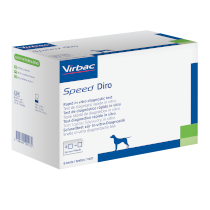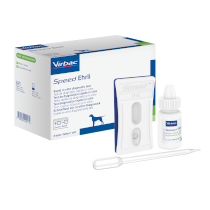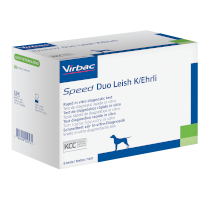
Rapid tests
Speed Leish K
Qualitative detection test for circulating antibodies against Leishmania infantum in dogs.
Speed Leish K detects the presence of Leishmania-specific anti-kinesin antibodies, highly immunogenic proteins present at all stages of infection.![180049_Packshot_Speed-Leish-K_right (1).png]()
Quick and easy to use, Speed Leish K tests deliver serological results in just 15 minutes.
Veterinary use only.
Product specifications
| Sample | Anticoagulated whole blood, serum, plasma |
|---|---|
| Species | Dogs |
| Manipulation | 1 minute |
| Time-to-results | 15 minutes |
| Storage | Long shelf life of 24 monts at room temperature (2°C - 30°C) |
| Presentation | Box of 6, 20 or 50 tests |
Why using Speed Leish K ?
Canine leishmaniasis is caused by the proliferation of Leishmania infantum in macrophages. It is transmitted by the phlebotomine midge.
After infection, the animal may remain apparently healthy for several months to several years before developing subclinical signs (proteinuria, hematobiochemical abnormalities) and then clinical signs (2).
In enzootic areas (around the Mediterranean bassin), a high proportion of dogs may be infected and eventually develop clinical signs(2)(3). As a result of climate change and animal travel to/from enzootic zones, the enzootic zone is gradually spreading northwards in Europe (3).
The detection of anti-kinesin antibodies by immunochromatography provides a screening tool with optimum performance for determining the status of an animal in a high-risk zone (2).
When to use Speed Leish K ?
Speed Leish K can be used in these situations :
- If clinical signs are suggestive, Speed Leish K can be used to clarify the etiological diagnosis.
- In endemic areas, regular use of Speed Leish K is strongly recommended for early detection of asymptomatic dogs (1) (2).
- When returning from an endemic zone, Speed Leish K can be used to detect potential seroconversion.
- Before vaccination against Leishmania
Quick guide
For complete instruction, please refer to the product notice.
1. Add 1 drop of sample into the sample well.
2. Add slowly 5 drops of reagent to the sample well.
3. Read the result at 15 minutes.
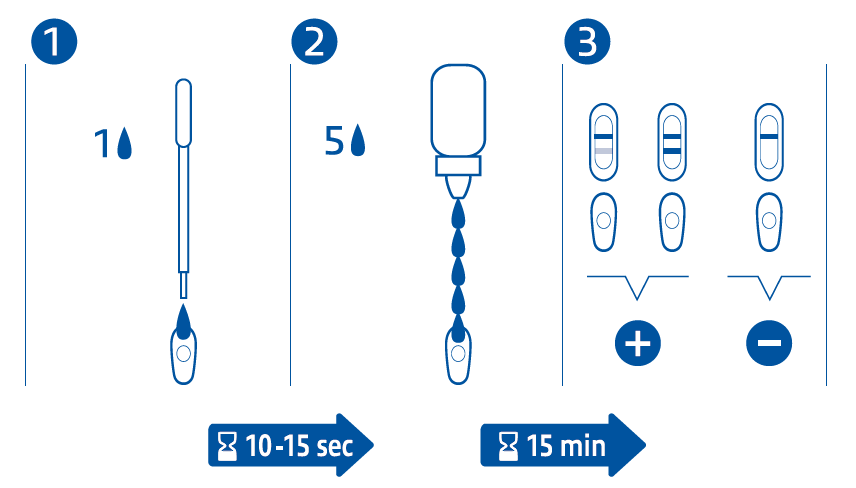
Speed Leish K performances
| Reference method |
Indirect ImmunoFluorescence (IFI) |
|---|---|
| Sensitivity vs ref |
98% |
| Specificity vs ref |
100% |
| Concordance IFI |
98.5%(1) |
References
(1) BOURDOISEAU G., CHENE J. CHABANNE L. et coll. Comparison of a rapid immunochromatographic test with immunofluorescence assay for the detection of anti-Leishmania infantum antibodies in dog. 2nd COongresso Internazionale SCIVAC - Leishmaniosi canina. Pisa - Italy, April 2010.
(2) SOLANO GALLEGO L. et coll. Directions for the diagnosis, clinical staging, treatment and prevention of canine leishmaniosis. Vet Parasitol 165 (2009) 1-18
(3) TROTZ-WILLIAMS L.A., TREES A.J. Systematic review of the distribution of the major vector-borne parasitic infections in dogs and cats in Europe. Vet Record, 2003, 152, 97-105
Follow european consensus about canine and feline Leishmaniasis on the LeishVet group website :

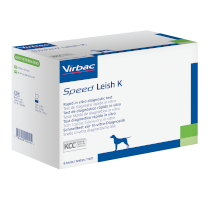

.png)
